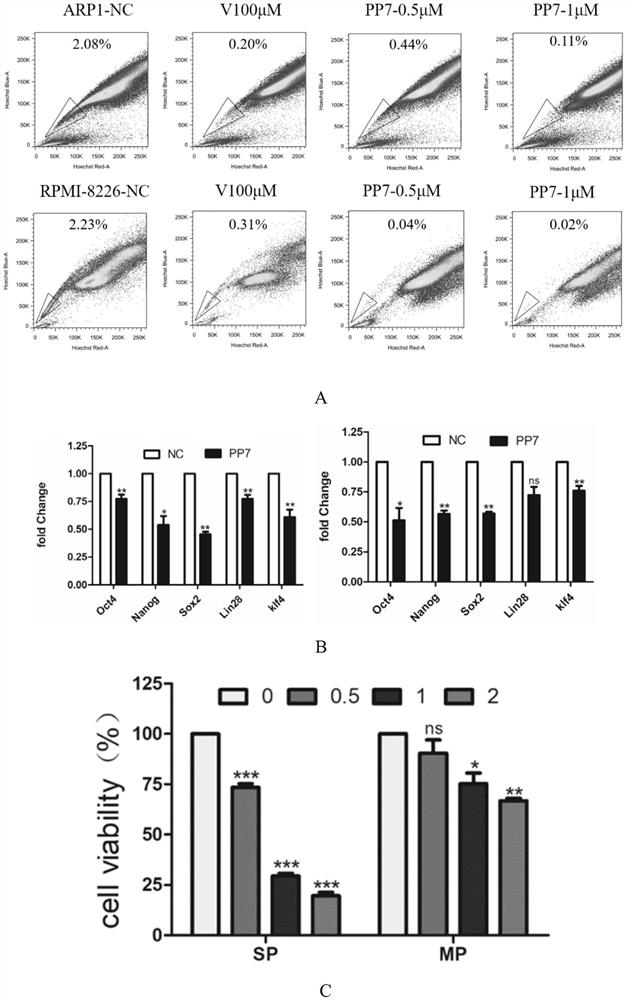Application of papaya saponin ⅶ in the preparation of msn protein inhibitor
A technology of papaya saponin and its use, which is applied in the application field of papaya saponin VII in the preparation of MSN protein inhibitors, and can solve the problems of unclear function of the target protein
- Summary
- Abstract
- Description
- Claims
- Application Information
AI Technical Summary
Problems solved by technology
Method used
Image
Examples
Embodiment 1
[0023] Example 1: Paprika saponin VII was identified as an ideal natural compound monomer for the treatment of multiple myeloma
[0024] Paprika saponins VII (PP7), Paprika papaya VI (PP6), and Paprika papaya I (PP1) of the saponin series (all purchased from Selleck Biotechnology Co., Ltd., USA) have antitumor activity. We first treated MM cells MM.1S (from ATCC), ARP1, ANBL6 and ANBL6-BR cells (all from Professor Zhou Wen, Institute of Cancer Research, Central South University) with these three monomers at a concentration of 2 μM, expecting to obtain Natural product monomers with optimal antitumor activity. After proving that the anti-tumor effect of saponin VII is the most significant, the CCK-8 method was used to detect the effect of saponin VII on immortalized B lymphocytes (from the Genetics Laboratory of School of Life Sciences, Central South University), MM cell lines, and normal human PBMC cells ( From Xiangya Hospital of Central South University) and MM patients with...
Embodiment 2
[0051] Example 2: Paprika saponin VII inhibits multiple myeloma stem cell-like cells and targets side population cells.
[0052] Flow cytometry was used to detect the effect of saponin Ⅶ on the ratio of side population cells of ARP1 and RPMI-8226 cells, and the effect of saponin Ⅶ on ARP11 and RPMI-8226 cell stemness genes Oct4, Nanog, Sox2, Lin28 and Klf4 were detected by qPCR. After the side population and main population of ARP1 cells were sorted by flow cytometry, CCK-8 was used to detect the effect of saponin Ⅶ on the survival rate of the side population and the main population of cells, and the soft agar colony formation assay was used to detect the effect of saponin Ⅶ on the side population of cells and the clonogenicity of main population cells. And the effect of saponin Ⅶ on primary CD138 in patients with MM was detected by flow cytometry + Effect of side population cell ratios.
[0053] The experimental steps are as follows:
[0054] 1. Flow cytometric detection o...
Embodiment 3
[0095] Example 3: Paprika saponin VII inhibits MSN protein
[0096] DARTS (Drug Affinity Response Target Stability Method) was used to search for the target protein of saponin Ⅶ. After the samples were treated with the DARTS method and CETSA (cell thermal transition analysis) method, WB was used to verify whether the MSN protein was the target protein of papaya saponin VII, and then WB was used to detect the difference in the expression of MSN in normal human immortalized B lymphocytes and MM cell lines, WB directly detected the changes of MSN protein after the treatment of ARP1 and MM.1S cells with saponin Ⅶ. Studies have found that small-molecule drugs will stabilize the protein conformation after binding to the protein, making it resistant to protease hydrolysis. The DARTS method was invented based on this principle. The drug ligand will also induce the thermal stability of the target protein, and the CETSA method was invented based on this principle.
[0097] 1. DARTS me...
PUM
 Login to View More
Login to View More Abstract
Description
Claims
Application Information
 Login to View More
Login to View More - Generate Ideas
- Intellectual Property
- Life Sciences
- Materials
- Tech Scout
- Unparalleled Data Quality
- Higher Quality Content
- 60% Fewer Hallucinations
Browse by: Latest US Patents, China's latest patents, Technical Efficacy Thesaurus, Application Domain, Technology Topic, Popular Technical Reports.
© 2025 PatSnap. All rights reserved.Legal|Privacy policy|Modern Slavery Act Transparency Statement|Sitemap|About US| Contact US: help@patsnap.com



